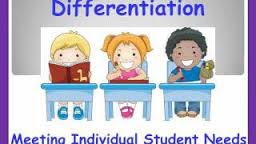
Hello! Welcome to Mrs.
B's Blog
Here you can gain information on many topics. This week we will discuss what Differentiated
Instruction. What is it ? How can you
implement it in your classroom ? What are the challenges of doing it? I
hope to help you answer these types of questions.
With differentiated instruction being used more and more by people,
it is important to help familiarize ourselves as to what teachers can do to
reach all their students.
I hope everyone
finds this blog valuable and informative.
Differentiated Instruction : What is It ?
Differentiation
is methods modifying instruction to meet individual student’s necessities.
Whether teachers set apart content, procedure, or the learning environment, the
use of continuing assessment and adjusting grouping can make an approach to
instruction successful.
Today we are seeing classrooms that have up to 35 students
with a variety of learning styles, backgrounds, personalities, interests, and
levels of content knowledge. In a differentiated classroom the teacher can
present the concept of the lesson in different means. This way it can fit to
all the learning styles of the class. The students can learn, practice, and show
their knowledge to the teacher. One argument in regards to differentiated
instruction is that the planning and executing of this type of instruction
takes more time. However, it’s goal it to meet the needs and learning styles of
all students.
Teachers
who implement differentiation in the classroom may:
- Plan lessons created on students’ learning styles.
- Set students by common interest, subject or capability for assignments.
- Evaluate students’ knowledge using formative assessment.
- Try to achieve a classroom to make a safe and supportive setting.
- Repeatedly gauge and correct lesson content to meet students’ needs.
Examples of Differentiated
Instruction
1.
Varying sets of reading questions
Adapt having a variety of questions that the students can choose
from in order to gauge their comprehension on the lesson being taught
2.
Modified course packet
Include in this work individualized remediation or enrichment
materials.
3.
An assessment
One that gets easier or harder depending on how a student is
successfully doing on the work.
4.
Coaching student
Having a one on one approach with the student to see their
challenges and ways you can work with them. By giving them extra attention you
can gear your lessons accordingly.
5.
Small Groups
Students assembled into small groups that are planned around
their strong points and weaknesses so that they can peer tutor each other.
A little about myself
My name is Kristina Ballester. I am
currently working on my Single subject credential in Math with a Master in
Education at National University. Currently, I am a substitute teacher and have
been for the past ten years. This past year I decided it was my time to put
down some roots and acquire my own classroom. I have experienced students,
classroom curriculum, testing, and the school environment change tremendously
over these years: however, I cannot imagine myself doing any other job. Being a
substitute teacher has allowed me to raise my four boys and support them with
their own education goals. I have 23 year old, 22 year old twins, and a 14 year
old son. All three of my sons received their BA in Business Administration and
one is now attending the graduate program at USC. In my spare time I enjoy
going on trips with my family, and couponing.




No comments:
Post a Comment